Chapter I.
Miss Fabri in the world. - Her vocation at the Redemptoristine Institute (1822-1844)
The Reverend Mother Mary-Aloyse of the Immaculate Heart of Mary, in the world Miss Isabelle-Fulvie-Albertine Fabri, was born on 22nd October 1822 at Sény, a village situated in the county of Nandrin in Condroye, in the Province of Liège. Her father was Mr. Arsène-Henri-Joseph Fabri; her mother was Marie-Agnès-Joséphine de Longrée. They dwelt in the countryside for a great part of the year and spent the winter months at Liège. Until 1830, Mr. Fabri was a member of the States-General. Fulvie was the youngest of six children, four boys and two girls. She was the family favourite, and, as she said later on, even somewhat spoiled by her mother, who by nature was rather strict and severe. From her childhood, she was favoured by extraordinary graces, which through her humility however, she would never explain clearly. When little children came and asked her for alms, she would first make them recite the “Our Father”; but as she herself did not know it in Walloon, she would call the girl from the poultry yard and get her to tell her if they knew it properly. Her parents were very pious, but also very demanding in matters of religion. When their daughters had been to Mass, they had to spend the whole day in recollection and were not allowed to look at themselves in a mirror. Fulvie received her education in the paternal home and never left it before she entered religion. From the time they were first capable, she and her sister took care of the sacristy in the village church. Dressing the statue of the Virgin Most Holy, looking after the sacred ornaments, and tending the lamp of the Holy Sacrament were all her favourite occupations. On Sundays, she would go to the church at daybreak to take communion, would let herself be locked in to dialogue alone with her God, while the village priest would go off and celebrate holy Mass in the neighbouring hamlet. While she was still very young, she felt herself called to religious life. Her brother was preparing to join the Redemptorist Fathers, and had received the Life of St. Alphonsus as a gift from them. Fulvie found it, read it, and fixed her choice irrevocably. She would be a Redemptoristine, and go, if it was necessary to receive this happiness, even to Vienna, the cradle of the Order beyond the Alps. How great was her joy, then, when she learnt that Mother Mary-Alphonsus of the Will of God had come to found the convent of Bruges, aided in this great enterprise by the Most Reverend Father Passerat! Mr. Fabri, although a good and fervent Catholic, was strongly opposed to his daughter’s vocation. He was advanced in age, and Bruges was so far from Liège! How could he make such a long journey? On the other hand, Mons. Van Bommel had just founded the Daughters of the Cross at Liège. With Mr. Fabri’s permission, he did everything possible to persuade the pious young girl to enter this Order, which was devoted to teaching and works of mercy, “And one day”, he said, “you’ll be the Superior there.” Mother Mary-Aloyse said later on, “It was precisely this which prevented me from entering.” To test her vocation, her father, who greatly loved his social life and spent all his evenings playing cards when he was in town, required her to accompany him to his meetings. She went along to satisfy him, but did everything possible not to be pleasing to the world. In spite of her outgoing character she even went as far as maintaining an almost complete silence. Her confessor, the Rev. Father Manvuisse, required her to dress plainly. Her mother, however, soon realised this and would inspect her closely to make sure that everything was in order. But then, at the very moment she was to enter her carriage, the young girl, pretending that she had forgotten something, would go back up to her room and hurriedly pick up dark gloves, a linen kerchief, or something else of this kind. As for going to a ball, she never knew it. When Father Manvuisse left Liège, Miss Fulvie came under the direction of the Rev. Father Dechamps. This holy religious, later a Cardinal, helped her greatly to overcome the obstacles that the affections of her parents placed in he way. This can be seen from the following letters:
1843.
“My daughter in Jesus Christ, “Yes, come on Thursday or Friday. When you are sad and confused, you should open your heart and seek advice. While you are waiting, offer up your sorrows to Jesus Christ. It is the money marked with the sign of the cross. It is this which leads to heaven, and which alone pays for the great treasure that you desire. The most holy and Immaculate Heart of Mary is for you. Do not let yourself be worried. “If your dear father promises to say “Yes” after mother, it is because he counts, no doubt, on having his own way. However, speak about it to your dear mother. There is no reason to say nothing to her about it. I am not annoyed that your father wants to speak to me on his own. Then he will be even more convinced that I am speaking with full certainty. “As you already have a rule of life, I shall limit myself to giving you some advice. “You must make a particular examination of your confidence in God. Confidence in troubles, - confidence among temptations, - confidence in persistently finding obstacles to achieving your good desires. “Be keen to do the will of God in the multitude of little things and He will do your will. If He is slow to do it, it is so that it will be even more worthy of Him. “I promise you I will adhere closely to this divine will. So as to judge you properly, I have to come to know you not just exteriorly, but interiorly too. Those who do not know everything can give you advice in good faith which runs contrary to the internal attraction to which your reason and Faith are responding. But I have no fear in saying that, if they do not recognise a genuine vocation in your desire, motivated and sustained for more than four years for the Community which the spirit of St. Alphonsus inspires, then they are deceiving themselves. Your exterior dispositions accord well with this Institute. It is very fervent, - and God has given you an affection for its holy Founder and the grace to enjoy its spirit. - It is enough for me to tell you this in writing, so that you can show it to whoever is entitled to see it, in case of need. But you must overcome the obstacles with patience and meekness.” The second letter expresses the same thought more deeply, and replies to another objection. 1843.
“My daughter in Christ, “You should not be afraid of being examined by the Vicar-General [2] about the matter of your vocation. No doubt God permits that sometimes one person says one thing and another person another. But it is also important for us to discern His will and feel the interior action of His grace, when it is manifested by the way of obedience. We must never lose sight of the fact that a vocation is a matter of interior grace, and that this can only be discerned by those who know you profoundly. “I hope that the Vicar-General will share my opinion. We could say, I am sure, that Redemptorists would naturally be in favour of the convent of which St. Alphonsus is the Father. - But it would be a mistake to assume this. - As for those persons who turned to me on matters of vocation, I have sent only one on to Bruges, and many others elsewhere: to the Ladies of Christian Instruction, to the Sisters of Our Lady, to the Daughters of the Cross, to the Carmelites, the Poor Clares, the Daughters of St. Joseph, etc., and I have sent an even greater number back to their families. My colleagues have all done the same. “If I have told you that you would do best to go to Bruges, it is because your dispositions and the character of that Institute have convinced me. If you go there you will still have your pains and your crosses, but so does everyone else. What matters is how you bear your own cross. “In Jesus and Mary, V. Dechamps, C. SS. R.”
Miss Fabri had revealed her temptations and apprehensions to her director. He wrote back to her:
23rd September 1843.
“Your last letter would have been very pleasing to God, because you say openly what is happening in your soul. Yes, it is always good to say it, even when it is past, and so much past that it would be hard to believe that you were ever disturbed by these sorts of fears or thoughts. Now that you have admitted it, may God give you His graces not to give in to all these apprehensions that have the power to crucify us. “You are not at the end of your troubles. “He who loves his father, mother, brothers and sisters more than Me is not worthy of Me.” But, my Saviour, surely You don’t ask everyone to make this sacrifice? - No, only those whom I love with a predilective love. Are you upset about being loved like this? This divine favour costs a great deal, so, as Madame Louise says, “Do not think about what it costs, but about what it is worth.” Then you will also have the inestimable happiness of no longer depending on your imagination and your own ideas, and you will always be able to say: “Now I only do what pleases Jesus Christ.” This is the freedom given to the children of God. “Fine sermons and fine services are good, especially for those who travel through the world dazzled by their own vanity, and who need to find God somewhere where their natural lives have not been absolutely crucified, but only directed towards a legitimate end. When you have left the world, you need this sort of help. And then God comes in solitude and silence. And when He hides Himself, you seek after Him, asking Him, “Even though You hide Your face from me until my death, I shall not leave You.” Life is short and is not intended for pleasure, but for trouble and work. “A little longer and You shall see Me”, says Our Lord. “Confidence and patience, patience and confidence, and a prayer for “Your most devoted servant in Jesus Christ, “V. Dechamps.”
Another time he wrote to her, “You will be a nun for sure, unless God takes you for His great convent where He Himself vests you in glory. I criticise you only for your lack of abandonment, confidence and hope. When you are unable to meditate, pick up your rosary beads and say acts of hope like you say the “Hail Marys”: “My God, I hope for heaven and the way that brings me there, through the infinite merits of Jesus Christ and prayers of the Most Sacred Heart of Mary.” Hope, Hope, and the assurance of God’s protection. Do not believe your own dark thoughts. Our good God always loves you intensely. We must hold firm to what He has promised. “Please remember me to all your dear and worthy family.” Things turned out as Father Dechamps had predicted, but “the great war of the vocation”, as he called it, could not be avoided, and it was at the price of some fierce battles that Miss Fabri finally won her father’s half-consent. She was then 21 years old. On 1st January 1844, her eldest brother arrived unexpectedly in Liège to take her to Bruges. She had to make her preparations for her departure in some haste. That evening she went to kiss her brother, the lawyer, good-bye and the following morning at 6 o’clock she bid her parents a final farewell. On her way she paid a last visit to one of her maternal uncles, and towards evening she arrived at Bruges. Following the custom of those days, she made a visit to the Bishop of Bruges, Mons. Boussen, to present herself. He asked her if she had obtained the consent of her parents. “Half, Your Lordship” replied her brother. “Oh well,” said the Bishop, “when that’s all you can have, you have to be satisfied with it.” A short while later and Miss Fabri was knocking on the door of the Redemptoristine Monastery.
Footnotes
[2] This Monastery was founded in 1844. All the details of this foundation can be read in the book called: Une Rédemptoristine. - Mère Marie-Alphonse de la Volonté de Dieu, fondatrice des premiers monastères des Rédemptoristines en-deçà des Alpes. - Souvenirs publiés par le P. Nimal, rédemptoriste. (A Redemptoristine. - Mother Mary-Alphonsus of the Will of God, the foundress of the first Redemptoristine Monasteries beyond the Alps. - Memorials published by Father Nimal, Redemptorist. (1 vol., Liège, Dessain, Paris, Ve Magnin).
We cannot mention this venerable nun without paying tribute here to her blessed memory. It was her, in fact, as Cardinal Dechamps has said, whom God made use of to make the Redemptoristine Institute known beyond the Alps. She was born at Lorient in 1793, she moved to Vienna in 1820, and in 1830 went to St. Agatha of the Goths to find the Redemptoristine Rule. She received the habit of her Institute at Rome from the hands of Cardinal Odescalchi, built the Monastery of Vienna and founded the Monastery of Bruges in 1841. She died at Malines in an odour of sanctity on 29th March 1869. She was a faithful disciple of the Venerable Father Joseph Passerat, and communicated to her daughters the esteem which this great servant of God professed for St. Alphonsus’ wonderful books.
[3] Father Jacquemotte, the Vicar-General of Liège, and family friend.
We cannot mention this venerable nun without paying tribute here to her blessed memory. It was her, in fact, as Cardinal Dechamps has said, whom God made use of to make the Redemptoristine Institute known beyond the Alps. She was born at Lorient in 1793, she moved to Vienna in 1820, and in 1830 went to St. Agatha of the Goths to find the Redemptoristine Rule. She received the habit of her Institute at Rome from the hands of Cardinal Odescalchi, built the Monastery of Vienna and founded the Monastery of Bruges in 1841. She died at Malines in an odour of sanctity on 29th March 1869. She was a faithful disciple of the Venerable Father Joseph Passerat, and communicated to her daughters the esteem which this great servant of God professed for St. Alphonsus’ wonderful books.
[3] Father Jacquemotte, the Vicar-General of Liège, and family friend.
This necrology is translated from Fleurs de l'Institut des Rédemptoristines by Mr John R. Bradbury. The copyright of this translation is the property of the Redemptoristine Nuns of Maitland, Australia. The integral version of the translated book
will be posted here as the necrologies appear.
will be posted here as the necrologies appear.
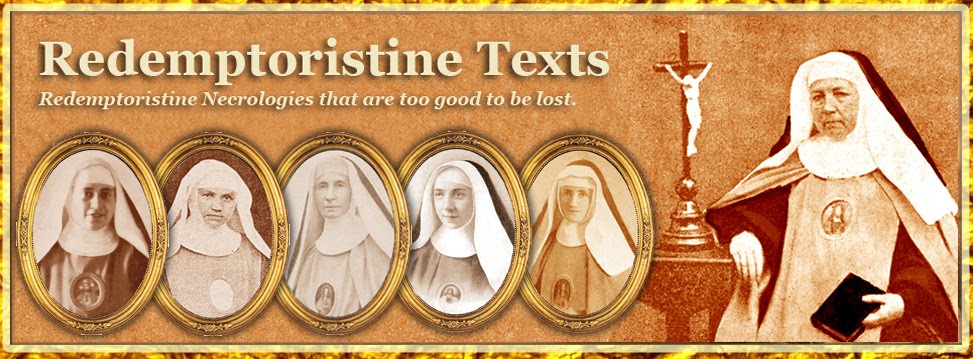



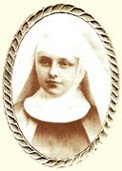

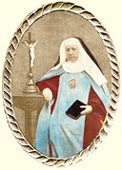
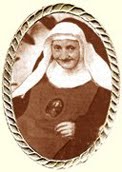
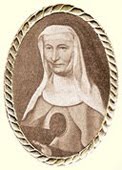













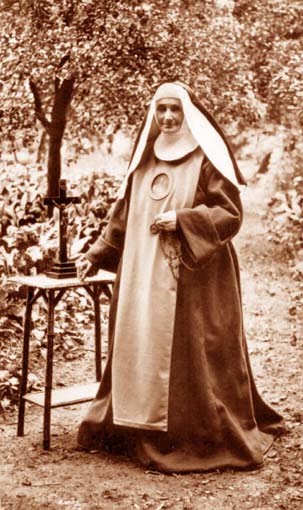

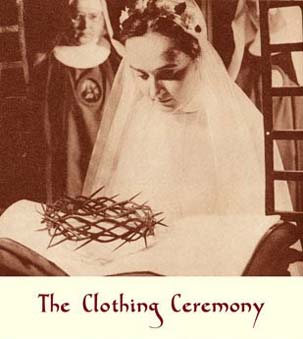
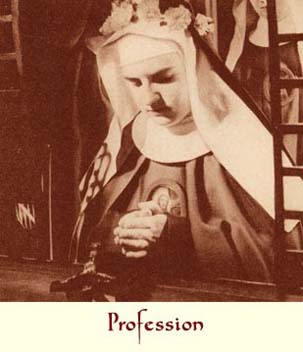



No comments:
Post a Comment